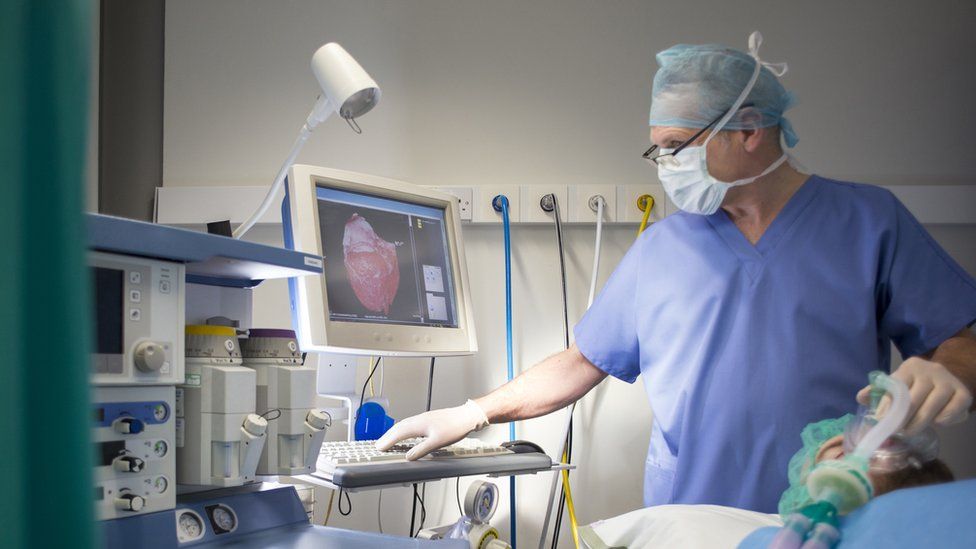ARTICLE AD BOX
 Image source, Getty Images
Image source, Getty Images
By Jim Reed
Health reporter
Extreme disruption to NHS services has been driving a sharp spike in heart disease deaths since the start of the pandemic, a charity has warned.
The British Heart Foundation (BHF) said ambulance delays, inaccessible care and waits for surgery are linked to 30,000 excess cardiac deaths in England.
It has called for a new strategy to reduce "unacceptable" waiting times.
The government has said it is investing another £500m to ease pressure on ambulances and boost hospital capacity.
The BHF said its analysis suggests 395,000 people in England could be on a waiting list for a heart test or procedure by April 2023 based on current trends, up from 224,000 before the start of the Covid pandemic.
'Fighting to stay conscious'
In August, Phil Moore, a former professional skier, had a heart attack as he was walking to his car after a shopping trip.
The 50-year-old from Kent said: "It came on very suddenly, with no warning, and I felt very, very sick."
He rang 999 twice but said he had to wait about 40 minutes for an ambulance as he faded in and out of consciousness.
"You worry about it afterwards but at that stage, all your focus is just on surviving," he said.
Paramedics arrived and took Mr Moore, who used to work for the BHF, to an emergency cardiac unit in Ashford for angioplasty - a procedure that widens a blocked artery so blood can flow more easily.
"It was very scary, because it goes through your mind that I want to speak to my wife again, I want to speak to my children again, but you don't know if you're going to."
Doctors and groups representing patients have become increasingly concerned about the high number of deaths of any cause recorded this year.
Data from the Office for National Statistics suggests the overall number was 17% higher in England than would have been expected in the week ending 21 October, based on the average for previous years.
Some of that rise can still be explained by Covid, which was mentioned on 523 death certificates in England over the week of 14 October.
Another factor could be the ageing population. The headline excess deaths data does not take into account the fact that there are now more older people. This may be responsible for more than half of the total excess.
Waiting lists and ambulance delays
New analysis of the mortality data by the BHF suggests heart disease is among the most common causes, responsible for 230 deaths a week above expected rates since February 2020.
The charity said "significant and widespread" disruption to heart care services was driving the increase.
Its analysis of NHS data showed that 346,129 people were waiting for time-sensitive cardiac care at the end of August 2022, up 49% since February 2020.
It said 7,467 patients had been waiting more than a year for a heart procedure - 267 times higher than before the pandemic.
At the same time, the average ambulance response time for a suspected heart attack has risen to 48 minutes in England against a target of 18 minutes, according to the latest NHS figures.
The BHF said difficulty accessing face-to-face GP and hospital care may have also contributed to the rise.
It cited modelling from NHS England which suggested the drop in people having their blood pressure checked because of Covid could lead to an extra 11,190 heart attacks and 17,702 strokes over three years.
Image source, BHF
Image caption,Dr Charmaine Griffiths, the chief executive of the BHF, is calling for urgent action to reduce staff shortages in cardiac care
Dr Charmaine Griffiths, the BHF's chief executive, said: "It is devastating that the ongoing and extreme disruption to heart care has meant that 30,000 more families have lost a loved one.
"Many hundreds of thousands of people fear that their heart condition could get worse before they get treatment - potentially stopping them from working or enjoying a full life. Many more are completely unaware they now have a condition putting them at a greater risk of early death from a heart attack or stroke."
The charity is calling for a new national heart strategy to cut waiting times for GP appointments, address staff shortages in cardiac care and increase investment in medical research.
The Department of Health said the NHS has made progress tackling the longest treatment backlogs with waits of more than two years "virtually eliminated".
A spokesman added: "We're improving care and outcomes for people with heart disease by opening over 80 community diagnostic centres across the country, which have already delivered over two million additional checks.
"We recognise the pressures ambulances are facing and we've set out a range of measures to help ease this, including an extra £500m to speed up discharge and free up hospital beds, reduce waits in A&E and get ambulances quickly back out on the road."

 2 years ago
42
2 years ago
42








 English (US) ·
English (US) ·